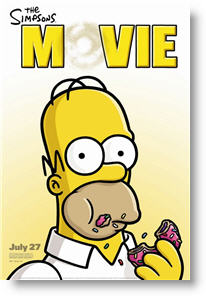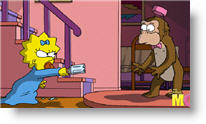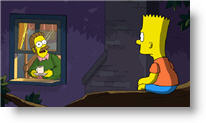The Simpsons Movie
 for irreverent humor throughout.
for irreverent humor throughout.
Reviewed by: Kenneth R. Morefield
CONTRIBUTOR
| Moral Rating: | Offensive |
| Moviemaking Quality: |
|
| Primary Audience: | Teens Adults |
| Genre: | Animation Comedy |
| Length: | 1 hr. 27 min. |
| Year of Release: | 2007 |
| USA Release: |
July 27, 2007 (wide) |









| Featuring |
|---|
| Dan Castellaneta (Homer), Julie Kavner (Marge), Nancy Cartwright (Bart), Yeardley Smith (Lisa), Hank Azaria, Harry Shearer, Albert Brooks, Minnie Driver, Kelsey Grammer (Sideshow Bob), Pamela Hayden, Tress MacNeille, Maggie Roswell, Russi Taylor, Marcia Wallace, Karl Wiedergott |
| Director |
|
David Silverman |
| Producer |
| David Mirkin, James L. Brooks, Al Jean |
| Distributor |
“See our family. And feel better about yours.”
In case anyone needs to know, I am an unabashed fan of “The Simpsons” television program. I own the first nine seasons on DVD. I periodically recite lines from favorite episodes (the most commonly cited quote involves Walt Whitman). At one point I owned not one but two Homer Simpson talking alarm clocks. I am, in other words, qualified in this instance to practice what André Bazin called “appreciative criticism.”
I recall, years ago, sponsoring a social activity at the church I was attending that included watching several episodes of the show (including “Homer vs. Lisa and the 8th Commandment”). I also recall another member sharing with me some of the e-mails he received from people expressing their contempt and scorn at us for thinking there was anything of worth to be gleaned from (or enjoyed by) sampling the newest nadir in the cultural wasteland.
It is ten years later and the creators of “The Simpsons” are still cranking out episodes and, now, a feature film. Obviously, I’ve never quite bought into the argument that “The Simpsons” was the next worst thing (nor even an access portal to the slippery slope that led us to “Married… With Children” and “Drawn Together”), but neither have I ever been truly sold on the argument that “The Simpsons” is subversively religious, conservative, or pro-family. Sure, Marge and Homer have been married longer than most couples I know, and, yes, Ned Flanders is exasperatingly sincere in his zealous beliefs. Take a stroll through any random selection of a half-dozen or so of creator Matt Groening’s seminal “Life in Hell” comic strips, though, and you will recognize not only the seeds of the series’ arch satire but also those of its spiritually nihilistic sheen.
What has always redeemed “The Simpsons”, though, is that it is funny, and the film is no exception. The loose plot of the film revolves around the family’s attempts to escape from Springfield and then rescue the town from the cumulative effects of Homer’s stupidity, which push the city past an ecological tipping point and prompt the wrath of the federal government.
Over and around this frame we get to see Bart’s genitalia, Disney-styled animals helping to strip Marge and Homer for intimacy, Grandpa having a stroke (or delivering a prophetic vision), Ned Flanders assuring his boys that the Buddha won’t be around when they meet Jesus (who he advises they address as “Mr. Christ”), and a slew of references to how the American government manages to be simultaneously totalitarian and inept.
In other words, I seriously doubt anyone who finds the show even mildly offensive (either directly or via the spiritual grapevine) will fail to find the film every bit as crass at “I Now Pronounce You Chuck and Larry” or nearly as spiritually damaging as any random Harry Potter film. Then again, I doubt those who would feel that way need me to confirm their opinions.
I think there may also be some who will profess to be fans of the show (particularly in its softer moments) but claim the film goes out of its way to make gratuitous jabs at Christianity and thus offends even their sensibilities. I don’t agree—I think the film and TV show mock pretty much everything, and organized religions get more or less their fair share of abuse—but I will understand where those reactions are coming from. The film rises (or sinks) to the Juvenalian level of satire often enough that those who want to call it out for being too fixated on one or two targets will find ample ammunition within the film to make that argument; I’m just not sure who they might make it to.
Is the film funny? Yes, though not as much as I hoped, and not in all the ways that I hoped. The best episodes of “The Simpsons” are the ones that have strong story lines and earn laughs from insight into the human condition rather than from mere caricature or generic zaniness. The humor in the film tends a bit towards the slapstick, while the pacing resembles that of later seasons of the television show where the viewer can at times feel bombarded with jokes rather than peppered with them. There are titters and giggles aplenty, but few moments of transcendent, timeless humor. In some ways, the film this most reminds me of is “Monty Python and the Holy Grail.” The funny parts are very, very funny, and they are what one tends to remember more than the misfires. Like the Monty Python films, people may also remember “The Simpsons Movie” as being funnier than it is, simply because they will enjoy reliving and retelling the funniest parts. It will be enjoyed by many, perhaps repeatedly, but I don’t know that it will (or should) be treasured any.
My Grade: B+
Violence: Moderate / Profanity: Moderate / Sex/Nudity: Moderate


Offensive / 5
Yes, there is rude humor (as I’ve stated above) but out of the whole ninety minutes, if you stacked all the inappropriate humor all at once it would only cover about three minutes of the whole film. I was very impressed. It wasn’t OUTRAGEOUSLY inappropriate, it was just a fun movie, kept at an appropriate level. Yes, it did deserve the mild PG-13 rating that it got, but that was already expected from the previews stating: PG-13. I highly enjoyed the movie, but I wouldn’t take younger children to it, despite the fact that it was a: Cartoon.
Average / 4½
Better than Average / 4½
Average / 4
Average / 4
First, I’ll get the bad stuff out of the way:
1. The scene with Bart skateboarding through town naked was seriously sick, and we REALLY didn’t need to see Bart’s privates.
2. Some of the anti-Christian comments, especially those made by Homer in the beginning, were downright mean. However, an important point to consider is that Homer is generally NOT portrayed in a positive light, even though he is the main character. He is frequently shown as a mean, stupid jerk and a bad father who only occasionally does the right thing. If Homer made those comments yet was still portrayed as a really good and smart person, or if Lisa (Who is almost always portrayed as a saint on the show) made those comments, then I’d be more angry about it.
3. I was annoyed at how the film at times becomes yet another lecture about the environment. Don’t get me wrong, as Christians we are obligated to care for the planet God gave us, it’s just that continually cramming that message down my throat over and over again in various movies and shows (Especially when I already try to live a relatively eco-friendly lifestyle and try to avoid wasting things) tends to leave a bad taste in my mouth. It goes beyond being informative and inspiring, and simply becomes heavy-handed and preachy.
4. This isn’t really a moral issue, but I thought the new villain they introduced in the film was kind of a dud. Sideshow Bob would probably have made a better bad guy (I had heard that he would be in the film, but I guess they cut him out at the last minute).
Now for what I liked about the movie.
1. First and foremost, it had plenty of incredibly funny moments, usually the parts which emphasize how dim-witted and accident-prone Homer is. One of my favorite parts was when he attempts to scare away the people breaking through the door to his bedroom by pretending he has a chainsaw. Just hearing the way he made those funny chainsaw noises (And the fact that the people actually fell for it at first) made me laugh out loud. Of course, the various painful accidents Homer falls victim to in the movie also produced a lot of belly-laughs from myself, my friend who was watching it with me (Who, like me, is a fairly devout Christian), and the rest of the audience.
2. I was glad that one scene towards the climax of the film featured class nerd Martin Prince finally standing up to the bullies who had tormented him all throughout the show (Though the fact that he does so in such a violent manner may send the wrong message, another reason why this film should not be viewed by young children).
3. The film ultimately does have a good message about physical and moral courage, not running from your problems, and doing what you know to be right and responsible. Homer went from living a completely selfish and self-absorbed life to risking his life to save his family, and ultimately all of Springfield. Speaking of which, the climax in which Homer and Bart save Springfield from getting blown up was downright thrilling, one of the best animated action sequences I’ve seen in a very long time.
4. I was, for the most part, VERY impressed with the film’s portrayal of Ned Flanders. Over the course of the last several seasons of the show, their portrayal of Ned has become increasingly negative, usually portraying him as a stupid, ignorant zealot who’s always proven wrong in some way. However, the movie reverses this, portraying Ned Flanders more like how he was in the show’s first few seasons: A very friendly, generous and loving man who cares deeply for his friends and neighbors, and possesses a true servant’s heart. He goes out of his way to be kind and compassionate to Bart, and is shown to be clearly a better father than Homer is.
Basically, diehard fans of the show will enjoy the movie, and any adults should just pray for discernment on whether or not seeing it would be a good idea. I, however, mostly really enjoyed it. BTW, those who see it should stay through the closing credits to hear baby Maggie’s first word!
Offensive / 4½
Moral rating: Average / Moviemaking quality: 4
Offensive / 5
Average / 3
Extremely Offensive / 5
Offensive / 4½
- Bart and his skateboard riding incident in the buff (his dad dared him). In this scene early in the movie, his private part was initially masked during his skate run only to be revealed through the open gaps of a park bench, also a boy on the street, upon seeing Bart, expressed his new like for boys, a father (Ned Flanders) saying the p* word (male anatomy) in front of his kids during a blessing when Bart crashes onto the restaurant window, Bart then gets handcuffed to a light pool while still in the buff. The sad commentary is that there was a number of people in the audience who thought this was all quite funny. I felt as if the audience was tricked into finding humor in all this.
Here some other objectionable scenes you should be aware about:
- Homer expresses his fondness for the town folks by flicking them off with both hands.
- Bart gets drunk—and his folks are aware of this
- Two police cops are shown to crash through a door of a motel room expressing their fondness for each.
- Homer flips through a bible and says “There are no answers in here.”
- Marge blurts on an expletive near the end of the movie that I found totally unnecessary.
These are just a handful of objectionable scenes (there are others). Had they removed these scenes there’s no doubt it could have been a much more entertaining (and safe) movie. But the fact is these scenes are in there, and even if you have it on DVD, it would be impossible to know when to skip past parts. So, while I might list it high on the aspect of creativity, I would rate it extremely low on the aspect of morality. Whether you are a Simpson’s fan or not, it’s simply not the kind of movie you want to take your kids to or see yourself.
Extremely Offensive / 4
Extremely Offensive / 3½
Extremely Offensive / 3
Extremely Offensive / 1
Extremely Offensive / 1
The film even goes a step further by making fun of Jesus, God, and the scriptures. In one scene Homer is flipping through the Bible and states “there are no answers in here.” This isn’t a message that benefits anyone, especially young children. My wife and I were both upset after leaving not only because of the offensive material in the movie, but because of the amount of children that were there in the theatre. They laughed at the jokes and repeated the statements made. I heard one child repeat a phrase by Homer in which he used God’s name in vain. Overall, the movie is ungodly. Nothing good can come about from watching it unless one thinks of the pleasures of sin as good. It is quite shocking to see that some who wear the banner of Christ would recommend, promote, and defend such an ungodly movie. Paul said it best—Finally, brothers, whatever is true, whatever is noble, whatever is right, whatever is pure, whatever is lovely, whatever is admirable—if anything is excellent or praiseworthy—think about such things (Philippians 4:8).
Extremely Offensive / 3
I am not a bible-thumper, but some things do not sit with me. First off, I only watched the entire length of this movie only because I had my nephews with my kids as well and it was the first of a double feature with die hard 4. This movie was very offensive and downright nasty considering it is geared towards children.
Here’s what was wrong, and everyone up and down the line at the production line is at fault for. At the beginning of the movie, church is going on and the simpsons are late. we see them getting out of the car from their shadow through the stained glass and the whole church hears their conversations as they’re walking towards the front door. Marge says something along the lines of hating that they’re always late for church and to be quiet because people will hear them talking outside to which Homer replies, “relaaax, they’re all busy praying to their phoney-baloney God.”
Back at home, Homer dares Bart to skateboard to the quick-e-mart (I think) and back home NUDE. after Homer taunts him, Bart takes him up on the dare and whips off all his clothes and skateboards naked. looked funny how they made sure his penis was covered, with the usual leaf, hose, statue or whatever was in his path. I was shocked to see him pass a bench in a park which only covered his stomach and they let us see his penis frontal view for a true second. …Even more shocking was that he passed by Chief Wiggums boy (Ralph) in an alley and they focused on him after Bart left the view. Ralph’s eyes widened and he smiled broadly and proclaimed ever so clearly in his little boy voice, “I like MEN now!” later on, Homer’s family is on the run and their pictures are posted all over town wanted by the police.
At one point Marge and family are on the street and see two MALE cops walking towards them. Frozen in fear, they watch as the uniformed cops blindly pass them and their wanted poster and grab each other with lust and kiss passionately on the lips falling into a door (probably a motel, not sure where because I cringed). Later homer gets a pig somehow and keeps it as his pet. they were alone on the couch watching tv where a horse or mule was shown kissing a man or woman on the lips (of course). homer laughs, the pig and homer look at each other awkwardly and the mood changes. Homer says, “Maybe WE should kiss to break the tension!” then Marge breaks in the scene and Homer composes himself. Later, they showed a bird’s eye view of the city and when there was an impending doom (forgot exactly the situation) everyone was running out of their houses, they showed a mob of people get out of church and run to Moe’s Tavern and simultaneously showed a mob of people run out of Moe’s and into the church, as if to say, when there is impending doom, the drunks want to be saved and go to church, while the churchgoers abandon their faith and go to get drunk.
Homer is also shown flipping the bird with both hands (he has only 4 fingers, but the meaning was obvious) to all around him as he tries to escape from police and people. Homer and marge are shown in a bedroom in Alaska, getting ready to have a romantic time and birds fly in the window taking off their clothes, where we get to see marge in sexy lingerie—are any of these scenes necessary? I used to like these cartoons, as they always had some kind of good message in regards to faith, Homer would redeem himself somehow and things would work out, but this was not the intention of the movie. …
Extremely Offensive / 4
Extremely Offensive / 1
Anyway, I was pretty OK with most everything right up to the point that Marge used God’s name in vain… Why did they do this? Why does Marge need to scream 'Throw the G-D bomb!'. Why couldn’t she have just yelled “throw the bomb!”??? I’m not sorry that I have to take great offense for that. How can ANYONE be OK with using God’s name in vain. Maybe you should read Exodus chapter 20 again, if you do not understand. They broke a commandment, that is not “OK” with me. All in all, I am disappointed, I feel let down. I wish they would clean up the movie a bit, then I would be thrilled to add it to the DVD collection and put in on the shelf next to the seasons of TV show I have on DVD.
Offensive / 4
Average / 3½
Average / 3
I feel in my heart that that is about the worst the film has to offer for me. Everything else I found to be pure humor (from what I can remember anyway). Anything else that could be offensive is very mild in comparison to the whole film. And while I do not watch “The Simpsons” on tv, I am assuming the humor is basically the same in the movie as the show. There is also some political comedy (mainly around conserving the environment) and also a bit of religious comedy in there too, which may offend some. But, as far as the religion humor; you need to look at who’s viewpoint it is coming from. In this film we see good religion (Ned) and bad religion/the weird religion no one understands till they feel God religion (opening church scene/church-bar scene) So, therefore, one would know what to expect from it.
The few negatives aside, this was a great movie with a great story. It is something fresh for me, as I’ve not had a good laugh with a good central story in a long time. The comedy aspect basically lies in how random this movie is. My personal favorite part was the “Grand Theft Walrus.” I would suggest seeing this movie if you like laughing. If your going to take kids, cover their eyes when Bart goes skateboarding nude. Some humor will go over their head, but I’m sure they can enjoy the movie on the whole. Though, I would just suggest making it a night out for you couples out there, or just a movie to see with some friends.
Average / 4½
Excellent! / 4½
Average / 4
Offensive / 4½
Part 2, the good: There were several good things to point out. Homer forgives Springfield for exiling his family (he dumped pig poop in the lake, a bubble was put over the town, and the town rises in rebellion) and saves his family and the city. Bart finds a paternal figure in Ned Flanders that he never found in Homer, which I think is touching. Homer learns not to be selfish, and geeky Martin Prince stands up to the bullies that tormented him all his life. Also, there are many, many hilarious parts that are more than I can count, including Green Day playing the opening theme, a commercial with Tom Hanks, Ralph Wiggum saying “I like men now,” as nude Bart skateboards past him (Some may find it offensive), bar customers stealing everything in Moe’s bar, and more. Most of the badder parts can be funny too, but once again, they are not for little children. One of my favorite movies. …
Very Offensive / 4½
Moral rating: Average / Moviemaking quality: 3½
Offensive / 3



It is brilliant and spiritually intelligent, as Ned expresses his crisis of faith directly with his Lord, it is obviously written by someone who know a lot about Christianity. This is not an isolated segment of “The Simpsons”. Throughout the series, Ned deals with issues of religion and acceptance, hardship, loss, and many other issues in a very Christian way. The Simpsons themselves are also a “Christian” family that attend Church on a weekly basis.
And, despite all of their faults, the Simpsons never fail to make the decision that best expresses their sense of family and love for one another. The series relationship with Christianity is probably best summed up in the episode when Ned Flanders loses his wife. Ned goes into a deep depression and a crisis of faith so strong that he stops going to Church. As those who care for and admire him throughout the town reach out to him and as a Christian singer shows him, Ned realizes that through all his hardships God has been there to see him through.
The episode ends with one of the most Christian sequences in recent television history when the community welcomes him back to church and Ned responds I’m here every Sunday come rain or come shine. If you can get past the somewhat harsh language, this is a show that holds the American family up in a very positive light. Also, keep in mind that Ned Flanders is not there to mock Christianity, but to poke fun at the most important aspect of our lives in hopes of getting us to better understand our own humanity and our spirituality.
My Ratings: Offensive / 5